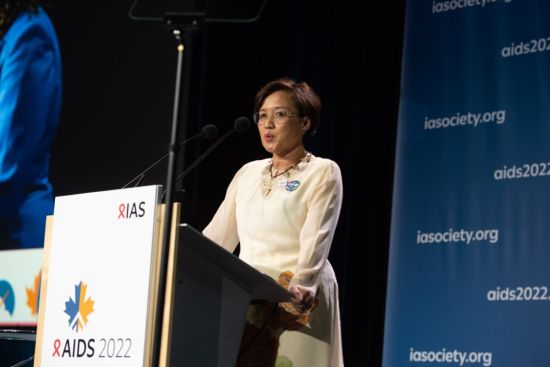Adeeba: Ending AIDS Impossible Without Engaging People Who Use Drugs
By Boo Su-Lyn | 23 November 2023
Prof Dr Adeeba Kamarulzaman says without engaging people who inject drugs (PWIDs), ending AIDS by 2030 will “remain a pipe dream”. A new GCDP report urges countries to decriminalise drug use. Only 54.5% of PWIDs with HIV in Malaysia currently receive ART.

Prof Dr Adeeba Kamarulzaman, immediate past president of the International AIDS Society., speaks at the closing ceremony of the 24th International AIDS Conference (AIDS 2022) in Montreal, Canada, on August 2, 2022. Picture by Marcus Rose/ IAS.
KUALA LUMPUR, Nov 23 – The global HIV/ AIDS epidemic cannot be ended by 2030 without significant reform to drug policies that criminalise people who use drugs, said the Global Commission on Drug Policy (GCDP).
Ahead of World AIDS Day, GCDP released a 2023 report titled “HIV, Hepatitis & Drug Policy Reform” that found that even though getting people living with HIV on antiretroviral treatment (ART) tripled globally over the past two decades to nearly 30 million today, the situation for people who inject drugs (PWID) living with HIV has not improved much.
“Ending AIDS by 2030 will remain a pipe dream if we do not double down on our efforts to effectively reach and engage with the community of people who inject drugs who are at extremely high risk of acquiring HIV,” said Prof Dr Adeeba Kamarulzaman, a GCDP member and president and pro-vice chancellor at Monash University in Malaysia, in a statement yesterday.
“And that will require in many countries an overhaul of their drug policies that continue to legally punish and incarcerate people for using drugs as opposed to attending to them in the public health system like other members of the community,” added the immediate past president of the International AIDS Society.
“It is disquieting that millions of people are still being unnecessarily placed at an extreme risk of acquiring HIV or Hepatitis and those who are living with viruses are being denied the fundamental human right to health, in terms of receiving accessible and appropriate treatment and care.
“It is no coincidence that countries like Portugal, Switzerland, Spain, and Germany – which treat drug use as a public health threat, and not a criminal one – have some of the lowest rates of HIV and hepatitis infection in the world. The lack of sufficient progress in the face of overwhelming evidence is shameful and is ruining and costing lives.”
According to the most recent data published by The Lancet’s Global Health journal on testing and treatment for HIV and hepatitis C infection among PWIDs, 144,000 people who inject drugs are estimated in Malaysia.
About 20,000 people who inject drugs living with HIV were reported in Malaysia.
More than half, or 54.5 per cent, of people who inject drugs with HIV in Malaysia are currently receiving antiretroviral therapy, equal to the share in the United States. Vietnam, however, recorded higher ART coverage of PWIDs with HIV at 81.9 per cent.
About 41.4 per cent of PWIDs in Malaysia were tested for HIV antibody in the past 12 months, exceeding Indonesia (39 per cent) but lower than Thailand (53.1 per cent).
Some 14.1 per cent of PWIDs in Malaysia showed HIV antibody prevalence.
At the regional level in East and Southeast Asia, 65.9 per cent of PWIDs with HIV currently receive HIV antiretroviral therapy, higher than Malaysia’s 54.5 per cent. About 86.4 per cent of PWIDs living in the region were tested for HIV antibodies in the past 12 months, also higher than Malaysia’s 41.4 per cent.
GCDP’s 2023 report urged countries to:
- Decriminalise drug use, drug possession for personal use, and the possession of drug paraphernalia.
- Protect people who use drugs from stigma or discrimination in accessing benefits or services, including education, housing, healthcare, social benefits, and employment.
- Fully resource and scale-up HIV and viral hepatitis prevention (harm reduction), diagnosis and treatment programmes, including in prisons and other closed settings.
- Ensure the availability of drug dependence treatment.
- Encourage, expand, and evaluate innovative harm reduction approaches — including drug consumption rooms, drug checking, heroin-assisted treatment, and safe supply initiatives.
- Involve people who use drugs in the development, design, implementation and monitoring, and evaluation of all HIV and viral hepatitis programmes.
“While people who inject drugs are at particular risk, there has been no appreciable decline either in the prevalence of injecting drug use, nor in HIV, hepatitis C (HCV) or hepatitis B (HBV) prevalence among people who inject drugs,” said GCDP in its report.
“People who use drugs have been left behind. Among people who inject drugs, one in seven is living with HIV, one in five is living with chronic HCV and one in 12 is living with chronic HBV.
“A course correction is greatly needed. Effectively addressing HIV and viral hepatitis among people who use drugs could end both epidemics.”
Contact:
Su-Lyn Boo
Editor-in-Chief
CodeBlue
sulyn@galencentre.org
Source: https://codeblue.galencentre.org/2023/11/23/adeeba-ending-aids-impossible-without-engaging-people-who-use-drugs/
"Reproduced with permission - CodeBlue"
CodeBlue
For more HIV and AIDS News visit...
Positively Positive - Living with HIV/AIDS:
HIV/AIDS News
|